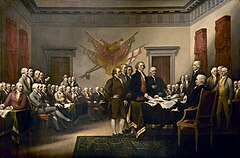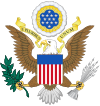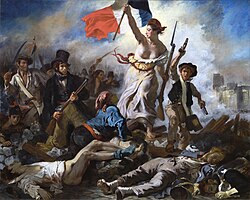
Back Amerikaanse Rewolusie Afrikaans الثورة الأمريكية Arabic Revolución Americana AST Amerika inqilabı Azerbaijani آمریکا اینقیلابی AZB Амэрыканская рэвалюцыя BE-X-OLD Американска революция Bulgarian মার্কিন বিপ্লব Bengali/Bangla Američka revolucija BS Revolució Americana Catalan
| Part of the Atlantic Revolutions | |
 The Continental Colors flag (1775–1777) | |
 The Committee of Five presenting its draft of the Declaration of Independence to the Second Continental Congress in Philadelphia on June 28, 1776, depicted in John Trumbull's 1818 portrait, Declaration of Independence | |
| Date | 1765 to 1783 |
|---|---|
| Location | Thirteen Colonies (1765–1775) United Colonies (1775–1781) United States (1781–1783) |
| Outcome |
|
| American Revolution | |||
|---|---|---|---|
| 1765–1783 | |||
Chronology
| |||
| Part of a series on the |
| American Revolution |
|---|
 |
|
|
| This article is part of a series on the |
| History of the United States |
|---|
 |
| Part of a series on |
| Political revolution |
|---|
 |
|
|
The American Revolution (1765–1783) was an ideological and political movement in the Thirteen Colonies which peaked when colonists initiated the ultimately successful war for independence (the American Revolutionary War) against the Kingdom of Great Britain. Leaders of the American Revolution were colonial separatist leaders who originally sought more autonomy as British subjects, but later assembled to support the Revolutionary War, which ended British colonial rule over the colonies, establishing their independence as the United States of America in July 1776.
Discontent with colonial rule began shortly after the defeat of France in the French and Indian War in 1763. Although the colonies had fought and supported the war, Parliament imposed new taxes to compensate for wartime costs and turned control of the colonies' western lands over to the British officials in Montreal. Representatives from several colonies convened the Stamp Act Congress; its "Declaration of Rights and Grievances" argued that taxation without representation violated their rights as Englishmen. In 1767, tensions flared again following the British Parliament's passage of the Townshend Acts. In an effort to quell the mounting rebellion, King George III deployed troops to Boston. A local confrontation resulted in the troops killing protesters in the Boston Massacre on March 5, 1770. In 1772, anti-tax demonstrators in Rhode Island destroyed the Royal Navy customs schooner Gaspee. On December 16, 1773, activists disguised as Indians instigated the Boston Tea Party and dumped chests of tea owned by the British East India Company into Boston Harbor. London closed Boston Harbor and enacted a series of punitive laws, which effectively ended self-government in Massachusetts.
In late 1774, 12 of the Thirteen Colonies (Georgia joined in 1775) sent delegates to the First Continental Congress in Philadelphia. It began coordinating Patriot resistance through underground networks of committees. In April 1775, British forces attempted to disarm local militias around Boston and engaged them. On June 14, 1775, the Second Continental Congress responded by authorizing formation of the Continental Army and appointing George Washington as its commander-in-chief. In August, the king proclaimed Massachusetts to be in a state of open defiance and rebellion. The Continental Army surrounded Boston, and the British withdrew by sea in March 1776, leaving the Patriots in control in every colony. In July 1776, the Second Continental Congress began to take on the role of governing a new nation. It passed the Lee Resolution for national independence on July 2, and on July 4, 1776, unanimously adopted the Declaration of Independence, which embodied the political philosophies of liberalism and republicanism, rejected monarchy and aristocracy, and famously proclaimed that "all men are created equal".
The fighting, now known as the Revolutionary War, continued for five years. During this time, the kingdom of France entered as an ally of the United States. The decisive victory came in the fall of 1781, when the combined American and French armies captured an entire British army in the Siege of Yorktown. The defeat led to the collapse of King George's control of Parliament, with a majority now in favor of ending the war on American terms. On September 3, 1783, the British signed the Treaty of Paris, granting the United States nearly all the territory east of the Mississippi River and south of the Great Lakes. About 60,000 Loyalists migrated to other British territories in Canada and elsewhere, but the great majority remained in the United States. With its victory in the American Revolution, the United States became the first constitutional republic in world history founded on the consent of the governed and the rule of law.